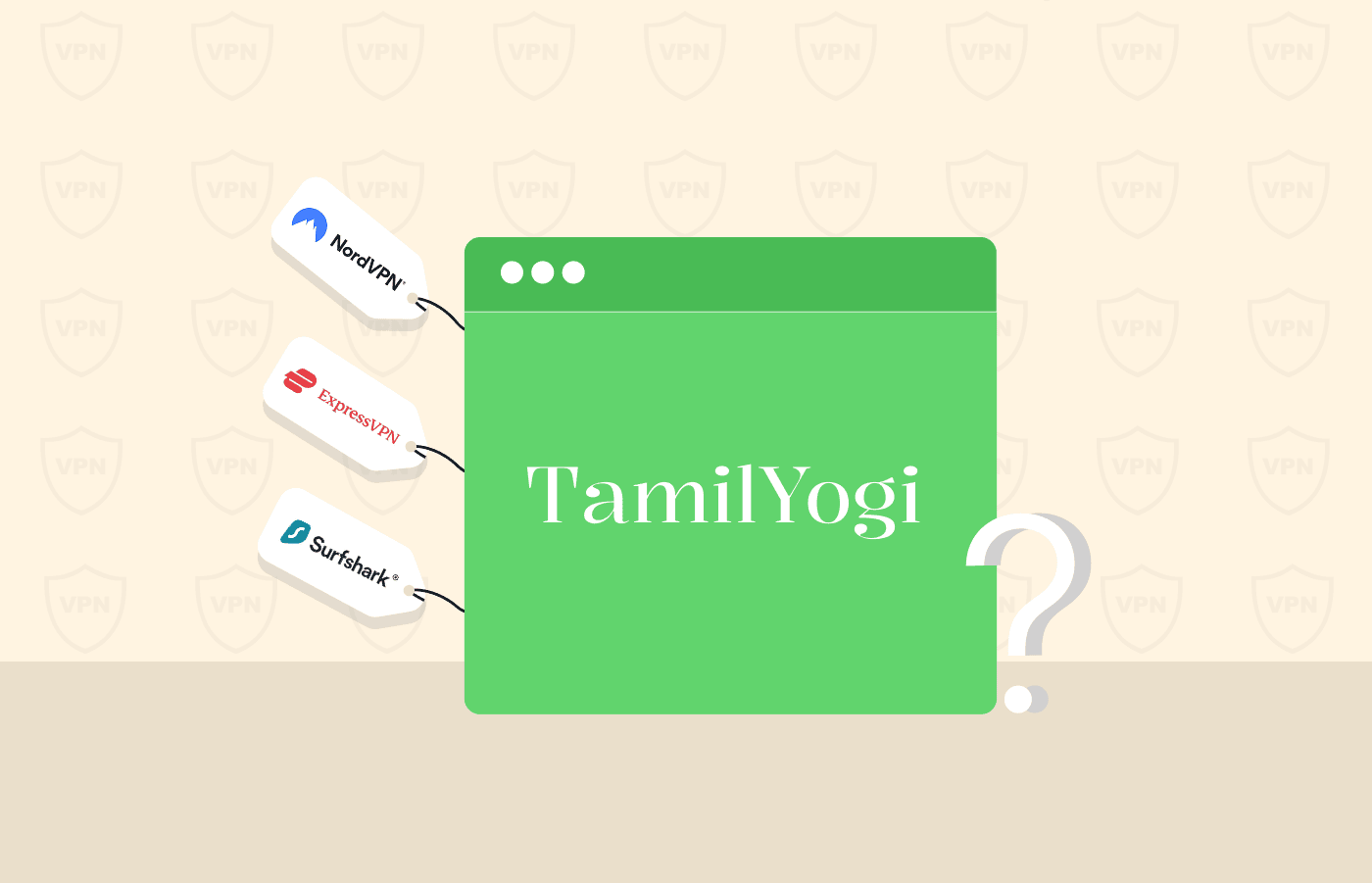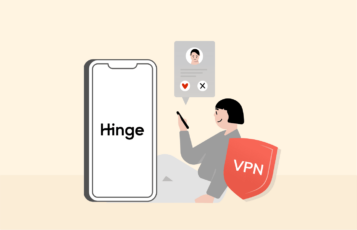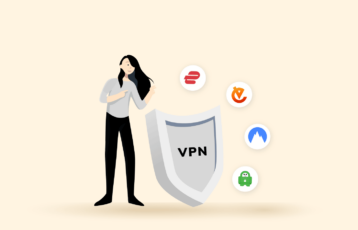Linux is a free operating system that is a top choice for people concerned about privacy. This is because it is open-source and highly customizable. Also, it is considered more secure against cyber threats than other platforms like Windows and macOS.
However, your data is still accessible to your ISP and other prying eyes. You must install a virtual private network (VPN) on your Linux OS. Unfortunately, the choices are limited, as only a few quality VPNs support Linux.
In this guide, we’ll look at the top 5 VPN services for Linux, how to install a VPN on Linux, and much more.
Best Linux VPNs – The quick list
Are you short on time? Here is a sneak peek of the top VPNs for Linux:
- NordVPN – Easy to install and use, great at unblocking streaming websites, and offers solid security.
- ExpressVPN – Compatible with various Linux distros. Also, it bypasses even the most stubborn geo-blocks, has fast-speed servers, and uses advanced security features.
- Surfshark – This does not limit the number of connections. Moreover, it provides high-speed, dependable security features and affordable packages.
- Proton VPN – Best free VPN for Linux. The app is exceptionally effortless to use, secure, and excellent for unblocking geo-blocked content.
- IPVanish – Budget-friendly VPN for Linux. It offers high-speed connections on selected servers and an impressive privacy and security features list.
Why should you use Linux?
Linux has adversely gained fame as many clients move from other operating systems like Windows and macOS. Linux is far better than other OS due to its added security features. It can detect viruses that mainly target operating systems.
The Linux operating system provides you with the ability to take control of your devices as well as the data. You can select your operating system from Linux distributions like Ubuntu, Kali, Fedora, Mint, and OpenSUSE.
Reports show that Microsoft and Apple collaborate with the NSA to create backdoors that help them snoop through your privacy.
Although Linux improves your privacy, The OS can only protect your data within the device, but once the data routes into the internet, you will need a VPN to help encrypt the traffic data. In addition, it is necessary to use a VPN if you want to hide your web traffic from your Internet Service Provider, government, and other third parties.
Another remarkable feature of Linux is its ability to bypass geo-restrictions on sites while providing online privacy. With Linux only, you can unblock streaming sites like Netflix and access gaming sites like BBC iPlayer from any location. With the best-recommended VPN, you can also torrent quickly and safely.
Benefits of a Linux VPN
Linux does better than other operating systems regarding protection against malware and viruses. However, you still need a VPN if you are a Linux user. Here is why.
Maintain your obscurity
Although Linux can detect and prevent malware attacks, it is not equipped to encrypt your web traffic. Here is where VPN comes in. The VPN will Cipher your internet traffic and mask your IP address, making it impossible for other users to access your online activities.
Unblock geo-restrictions
Due to licensing and copyright issues, many websites, applications, and other online services restrict their services to specific areas. However, you can bypass the restrictions and access the services anywhere with a VPN. For instance, you can connect to a U.S. server from China.
WiFi protection
WiFi hotspots have become popular in most public places like schools, buses, coffee shops, and airports. Although these hotspots are helpful, they are also insecure because hackers can easily trace your online activities and steal your data. With a VPN, your traffic is encrypted, and your IP address is hidden, making accessing your data impracticable.
Torrenting capabilities
Most ISPs restrict downloading or uploading torrents because of the copyright issue on most materials. They mainly control the bandwidth or even block your account if torrenting is caught. VPN will help you engage in torrenting activities anonymously.
5 best Linux VPNs today – The detailed list
Many VPN providers offer a Linux client, but only a few are convenient. These are the top Linux VPN services available.
1. NordVPN

Without any doubt the best VPN service for Linux. It boasts dedicated Linux support, military-grade encryption, and server obfuscation to support sensitive activities of Linux users.
Pros
- Emphasizes security and privacy
- Unblocks popular streaming sites
- Super-fast servers
Cons
- No free trial
Based on our extensive tests and research, NordVPN is the best VPN for Linux (Ubuntu). It is reasonably priced, unblocks all the major streaming sites, and offers a command-line Linux app.
Unfortunately, the command line doesn’t have a graphical user interface (GUI). However, it is much simpler to set up and use than configuring servers manually. In addition, the app has impressive features found on other operating systems like adblocker, malware filters, and automatic kill switch.
The provider has over 6,800 ultra-fast servers distributed across 113 countries worldwide. It will protect your connections with AES 256-bit encryption, perfect forward secrecy, and IKEv2 protocol. In addition, it observes a strict zero-logs policy and doesn’t retain any logs to keep you anonymous.
Moreover, NordVPN is good at unblocking content and can bypass streaming restrictions such as Netflix, Disney+, Hulu, etc. Thankfully, it has specialized streaming servers to give you a smooth watching experience.
2. ExpressVPN

With great unblocking and geo-block bypassing capabilities, ExpressVPN is a trusted and top VPN service for Linux systems.
Pros
- Comprehensive privacy and security features
- Substantial server network
- High-speed connections
Cons
- Expensive than its rivals
ExpressVPN is a well-known VPN for Linux because of the native app, exceptional security, and blazing-fast speeds.
The provider introduced the Linux app in 2016. Sadly, it lacks the GUI and only runs on a command-line interface. However, it’s much easier to manage than downloading configuration files for each server you want to use.
ExpressVPN has a massive network with over 3,000 servers in 107 countries. Fortunately, it keeps the server list up-to-date for improved performance. Also, the TrustedServer technology will ensure that the servers will not retain any of your data.
The only downside with ExpressVPN is that its plans are pricier than its rivals. Fortunately, you can take advantage of the 30-day money-back guarantee and test the service risk-free. In addition, it works well with Ubuntu, Fedora, Debian, CentOS, and Kali.
ExpressVPN easily bypasses restrictions of popular streaming services, including BBC iPlayer, Netflix, HBO Max, Amazon Prime Video, etc. In addition, with the fast-speed servers and unlimited data, you can watch content in ultra HD.
3. Surfshark

A pocket-friendly VPN for Linux users. Its resilient security, thorough privacy and anonymity, server obfuscation, and impressive speeds perfectly align the VPN with Linux’s privacy notions.
Pros
- Plenty of privacy and security features
- Does not retain identifiable data
- Reliable customer support
Cons
- Some servers are occasionally slow
Surfshark is the best VPN to unblock sites on Linux. It has budget-friendly plans and offers a command-line app for Debian and Ubuntu distros.
The provider has over 3200 servers in 100 countries, enabling you to access content and apps unavailable in your region. For example, you can unblock movies and TV shows on Hulu, Netflix, DAZN, etc.
Besides streaming, the VPN also supports P2P sharing. Its servers produce sufficient speed to handle even large downloads. Luckily, it follows a no-logs policy religiously, so your torrenting activities will remain private.
Surfshark will secure your web traffic with military-grade AES 256-bit encryption and perfect forward secrecy. In addition, it also has an automatic kill switch, DNS leak protection, and a variety of security protocols.
The Camouflage Mode will hide your VPN activity and make your connection look normal. Surfshark is helpful if you live in a country with strict internet censorship, like China.
4. Proton VPN

An affordable approach to go for Linux today. It has a simple interface, premium security, and thorough data privacy with no logs. Also, it’s the only free Linux VPN on this list.
Pros
- Strong privacy and security
- Supports torrenting
- Unblocks streaming services
Cons
- Lacks a live chat
Proton VPN is another excellent VPN to stream content abroad on Linux. This is because it has a command line that allows you to easily access and manage the servers from anywhere.
The best thing about the Proton VPN Linux app is that it’s open-source, so you can inspect and modify the code. Besides, it works well with Ubuntu, Kali, Fedora, Solus, and Arch Linux/Manjaro. Also, OpenVPN is the default protocol on all connections, and you can easily switch between servers.
Apart from offering affordable packages with a 30-day money-back guarantee, Proto VPN also has a free plan. It does not cap the data but allows you to connect only one device and access servers in 3 locations.
5. IPVanish

This service makes you anonymous while going for any task online. Thanks to its unlimited simultaneous connection support, IPVanish is a well-suited VPN for Linux users to protect all devices.
Pros
- Highly configurable
- Doesn’t monitor your activities
- Reasonable pricing
Cons
- Unable to bypass all restrictions
IPVanish is compatible with the Linux platform and has easy-to-follow tutorials for Ubuntu, Fedora, Mint, Kali, Lubuntu, and Pop! OS by System 76.
It will protect your connections from end-to-end in real-time with AES 128/256-bit encryption. This is strong security to prevent your ISP, hackers, advertisers, and third parties from monitoring your activities. Also, IPvanish does not record your logs to keep you completely anonymous.
The IPVanish VPN can evade geo-restrictions of popular streaming services such as Fox US, Hotstar India, BBC iPlayer UK, etc. In addition, it will enable you to watch blocked content on YouTube. But, unfortunately, it is unable to bypass all restrictions.
The top Linux VPNs comparison
| Service Provider | NordVPN | ExpressVPN | Surfshark | ProtonVPN | IPVanish |
|---|---|---|---|---|---|
| Number of Servers | 6,800+ in 113 countries | 3000+ in 107 countries | 3200+ in 100 nations | 9,000+ servers in 112 countries | 2,200 servers in 75 locations |
| Devices Supported | macOS & iOS, Android, Linux, Windows | macOS & iOS, Android, Windows, Linux | macOS & iOS, Android, Windows, Linux | macOS & iOS, Android, Windows, Linux | macOS & iOS, Android, Windows, Linux |
| Maximum Connection | 10 | 8 | Unlimited | 10 | Unlimited |
| GUI Client | Yes | Yes | Yes | Yes | Yes |
| Subscription Cost | $3.59/ month | $6.67/month | $2.39/month | $5.35/month | $2.49/month |
| Security | AES 256-bit encryption | AES 256-bit encryption | AES 256-bit encryption | AES 256-bit encryption | AES 128/256-bit encryption |
The methodology we used to test these VPNs for Linux

At PrivacySavvy, we use comprehensive and rigorous methods to test the VPNs we recommend. With these VPN services for Linux, we looked at the following:
- User experience an app quality
- The Linux distros supported
- Support and documentation for users
- Manual configurations with third-party VPN clients
We passed each VPN through a qualitative and quantitative test to present our readers with a service they can rely upon. The tests include:
- Leak tests: We checked whether the VPNs leaked data, including DNS, IPv6, and WebRTC.
- Speed Test: We connected to servers in different regions to see their performance and production speed.
- Bypassing geo-restrictions: Many streaming services use tough geo-blocks. So, we had to find VPNs that could easily evade the restrictions of popular sites such as Netflix.
Every VPN we have recommended on this list has passed our yardstick of quality, privacy, and security. This means they use the latest encryption and do not log IP addresses, activity logs, or other identifying data.
How you can use a VPN on Linux
Having gone through how a VPN works on Linux and some of the best VPNs, here are the various ways you can use a VPN on your Linux device.
Apply a custom Linux CLI client
The best VPN services now incorporate custom Linux command-line interface (CLI) clients. CLI is a text-based interface that lets you write and execute commands and view their output using a terminal emulator like GNOME Terminal.
Use a custom GUI Client for Linux VPN
You should use a custom Graphic User Interface Linux client to enjoy the premium VPN functionality like Windows and macOS users. Unfortunately, this feature is only accessible in several VPNs like TorGuard, Mullvad, PIA, AirVPN, and Proton VPN.
The providers of GUI VPN clients are similar to Windows and macOS and provide the same properties like WebRTC mitigation, DNS leak protection, kill switches, and other bells and whistles different to each provider. Most users find GUI clients user-friendly; thus, it’s easy to understand prompts and commands.
Use a NetworkManager as a Linux VPN GUI
Most Linux distros use the NetworkManager as a GUI interface to control their network connections. With a NetworkManager, it is easy to use a graphical interface while managing your VPN connectivity. The plugins available in the NetworkManager are for OpenVPN, IKEv2, and L2TP/IPsec. The PPTP VPN protocol is also supported.
Although the NetworkManager does not offer DNS leak protection and kill switches, most VPNs recommend its use.
The command line
You can easily set up and run a VPN using the command line with Linux. Although the command line depends on the type of Linux distro you use, OpenVPN is compatible with any Linux environment.
A quick guide to installing a VPN on Linux
There are several ways you can install a VPN on Linux. However, the type of distribution you are using will determine the package you’ll install, including Debian, tar.zst, or RPM. But still, below is a general guideline you should follow:
- Download the VPN’s repository package from the service provider’s website.
- Install the repository. The process will depend on your Linux version.
- In most cases, you’ll have to update the package list.
- Finally, install the actual VPN software.
Once you have completed the steps above, you can open the app and use the GUI or terminal to connect to the servers.
How do I connect a VPN using the Linux network manager?
The process will depend on the VPN provider and protocol you are using. Download the OpenVPN config files from the site and import them to the Linux Network Manager. Check on the official VPN’s website for documentation. Then, use the following steps to do it.
- On the top right of the screen, click the network button.
- Tap on VPN off and choose VPN settings from the drop-down menu.
- Click the (+) icon across from the VPN.
- Import your config file or choose the protocol to configure and enter the details.
- Click Add.
- The VPN connection will now appear in the configuration window. Click the slider to turn it green and activate the VPN.
Which one is the best free Linux VPN
Proton VPN is an excellent option if you are on a budget and looking for a decent Linux-free VPN. It’s not an entirely free VPN but a premium service with a free plan. The unlimited data and several server locations separate it from the rest.
More importantly, the company employs the necessary security and privacy measures even on the free version. For example, it offers AES 256-bit encryption, does not retain logs, and is based in Switzerland, a privacy-friendly country.
Furthermore, ProtonVPN’s Linux client has a simplified GUI and can even be used through the terminal. So, while customer support can be refined, it is much better than what you would get with a free VPN.
There aren’t many alternatives we can recommend. This is because most of them don’t offer support for Linux, have data caps, or come with security issues. These compromises are not worth making, yet you can opt for ProtonVPN.
VPN services you should avoid using on Linux
Not many VPNs offer support for Linux or provide limited support. In addition, some have a lot of security and privacy issues. Fortunately, the services we have listed above follow a strict no-logs policy, which means they don’t retain your identifiable information. As a result, hackers cannot infiltrate the provider’s servers and steal your data. Also, the company will not have any data to sell to third parties or submit to law enforcement.
Moreover, avoid VPN services that provide only PPTP protocol. It contains a lot of security vulnerabilities, although it is fast and straightforward to configure.
Below are some of the VPNs you should avoid:
1. SecurityKISS
SecurityKISS is a top-rated free VPN for Linux, and a simple search on Google might lead you to it. However, it is known for collecting IP addresses and connection logs, which can compromise your security. Also, the free version caps data to only 300MBs per day.
2. Itshidden
This is a free VPN based on the PPTP protocol, so it’s obviously not secure. Also, its privacy policy is very vague and even contains typos. For example, it is only one sentence and does not pronounce the company’s logging practices.
3. USAIP
USAIP is another mediocre VPN that claims to offer quality service. However, its latest Linux client only uses PPTP. Also, it doesn’t have DNS servers, so your ISP can still see your online activity. In addition, it doesn’t reveal its logging practices.
4. TunnelBear
This is a premium VPN, but it doesn’t offer a native Linux client. TunnelBear requires you to go through a manual configuration process, which is tiresome and time-wasting.
5. VyprVPN
VyprVPN is also a premium service; we’ve even featured it in several reviews. However, it only supports Linux Mint and Ubuntu. In addition, it doesn’t have a client and tutorial if you are using Red Hat-based Linux.
Additional security for Linux
A VPN will secure your Linux system, but you must do more for complete protection. Like other operating systems, Linux has vulnerabilities that malicious actors can exploit. Here are extra tools you can use to remain utterly secure.
- Antivirus software. You can check out our list of the best antivirus available today.
- Tripwire.
- Anti-rootkit software.
- Firewall. This article here lists quality free firewalls. You can find one for your Linux there.
- Secure browser extensions.
The best Linux distro for privacy
Going for an open-source Linux distro is good if you are concerned about privacy. Conventional platforms such as Windows and macOS are known for collecting personal data.
Also, they have a reputation for collaborating with intelligence agencies and law enforcement. Moreover, both operating systems are closed-sourced, preventing the public from viewing the source code to check for backdoors and vulnerabilities.
On the other hand, Linux is open source and is constantly audited to eliminate threats. There was a time when Ubuntu toyed with Amazon to monetize users. However, it and other Linux distros are not in the business of selling users’ data to third parties.
Remember that all distros aren’t created the same, with some being more secure than others. Ubuntu Privacy Remix (UPR) is your best bet for a daily-use distro with privacy and online security. This is built on Debian-based Ubuntu and keeps user data on an encrypted external hard drive. Since the OS is difficult to manipulate, it cannot get malware infection.
However, you will still require a VPN to secure your internet traffic. Most of the services we have recommended above work well on UPR.
If UPR doesn’t meet your needs and you still need complete privacy on your computer, you should opt for TAILS. It stands for The Amnesiac Incognito Live System and is a Linux distro created by the people who built the Tor Network.
This live operating system can be installed and run from external storage like a CD or USB drive. The best thing is that it passes internet connections through the Tor Network for added anonymity.
2025 Linux usage stats
- There are approximately 33 million Linux users as of 2025
- Linux includes a 2.78% market share in comparison to 70% for Windows and 16.57% for macOS.
- 2.68% of laptops and desktop PCs use Linux.
- 46.4% of the top one million websites use Linux.
- The most well-known Linux distributions are Ubuntu (33%), Debian (14.5%), and CentOS (10.8%).
- In the mobile and embedded systems markets, Linux powers 81% of smartphones and 63% of embedded systems.
- Linux runs all of the globe’s 500 supercomputers.
- Combining the 4.16% ChromeOS market share and Linux market share usage would add up to 7.24%, with ChromeOS composing 57.6% of the total.
Is a Linux OS distribution necessary when selecting a VPN?
Eventually, distributions like Ubuntu, Mint, and Kali became Debian-based. So they all work almost the same. However, a Red Hat-based distro has RPM packages, making the distribution slightly different from the Debian version. Usually, a provider offering Debian support also supports Red Hat.
Linux and VPN protocols
A VPN protocol is a method your device uses to connect to a secure server. They have different specifications and features. For example, while some prioritize privacy and security, others prioritize speed.
Linux and Wireguard
Wireguard is the newest protocol, and many VPNs already have or are in the process of integrating it. This protocol promises improved speed and competitive security compared to its competitors like IKEv2 and OpenVPN.
Although it works on almost all platforms, it was initially released for the Linux kernel. This means that you can use it within the VPN app or configure it manually. From the above list, NordVPN and Surfshark offer the protocol.
The Wireguard protocol is compatible with OpenSUSE, Debian, Fedora, Red Hat, OpenBSD, FreeBSD, CentOS, and numerous other Linux distros.
Linux and OpenVPN
Even if a VPN service doesn’t offer a dedicated Linux distro client, certainly most of them have OpenVPN protocol. So, to establish a VPN connection on your Linux, you’ll only need to download a config file of the server. Although this can get tedious if there are several server options, it’s perfectly viable.
OpenVPN is a great protocol, but the generic client lacks crucial features such as kill switches and DNS leak protection. Again, you can get third-party solutions for these. However, we prefer the convenience and reliability of clients with incorporated features.
How to install and connect to OpenVPN on Linux
This section will take you through installing the OpenVPN client on Ubuntu. The procedure is similar to other distros like CentOS and Mint, but the commands may vary slightly.
- Open a terminal.
- Type sudo apt-get install –y openvpn and click enter.
- Then type your admin password and press enter.
- Type y and tap Enter to accept all the dependencies and complete the installation process.
- Enter sudo apt-get install network-manager network manager-openvpn network-manager-openvpn-gnome and press enter.
- Enter sudo apt-get install open easy-rsa.
Remember that you may need to change the ‘apt-get’ command with ‘yum’ with the newer versions of Ubuntu.
After installing the OpenVPN protocol, you need to find the config file. You can usually get them on the VPN provider’s website. Note that each config file is linked with a specific server, so download several for each location if possible. Also, ensure you have backups in case one of the connections goes down.
Use the following guide to connect through the command line. It should work with most Linux distros.
- With OpenVPN installed, type sudo openvpn –config in the terminal and press enter.
- Drag and drop the .ovpn config file for the server you want to connect to into the terminal. The right path will be captured automatically.
- Press Enter and wait for the ‘Initialization Sequence Completed’ message. You can now connect to the VPN. Note that closing the terminal window will disconnect you from the VPN, so you can only minimize it.
This is just one of the methods of establishing a VPN. Alternatively, you can also try the OpenVPN GUI or Ubuntu Network Manager. However, this may need private keys or CA certificates, so ensure the provider offers them.
How to create a VPN kill switch in Linux?
If the VPN connection drops accidentally, your device will continue to transmit your traffic through your ISP’s unprotected network. Fortunately, you can create a simple kill switch to prevent this from happening. In this section, I’ll show you how to write rules with the Ubuntu Ultimate Firewall (UFW) application and iptables.
The first step is to make a startvpn.sh script to set up the firewall rules. They only allow traffic over the VPN’s tun0 network interface.

Network traffic can’t route through another network’s interface with these firewall rules. So, if the VPN stops working, it removes the tun0 interface from your system. This means your traffic won’t pass through as there isn’t any interface, and the internet connection will close.
After ending the VPN session, you must remove the rules to let traffic flow over your natural interfaces. The easiest way to do it is to deactivate the UFW application. However, you’ll have to create a more sophisticated tear-down script if UFW rules usually run. The one below will eliminate the firewall rules and remove the OpenVPN with stopvpn.sh script.

You can remove the last two lines on each script using another method to connect to your VPN. However, you’ll have to remember to run the startvpn.sh manually before you start the VPN with other means. Running the stopvpn.sh script isn’t complicated after ending your VPN session. In fact, you’ll notice that your internet cannot connect until you run it.
Creating your own VPN
Besides the commercial VPN services, there is also an option to create a DIY VPN solution for Linux, including setting up a server. Some of the common examples include Digital Ocean and Amazon Web Services. In addition, various tools are available to help you make a homegrown VPN. They include:
- Streisand
- OpenVPN
- Algo
- StrongSwan
- SoftEther
Although creating your own VPN allows you to control almost every aspect of the VPN, there are a few downsides. First, it isn’t easy and involves much work compared to pre-configured servers and existing apps. Second, your data will still route through third parties using cloud services such as Digital Ocean or AWL. Third, you can only access a single server and location.
Lastly, launching your VPN means only you and maybe a few friends will use it. As a result, tracing web traffic to a specific individual will be much easier. On the other hand, the premium VPNs we have recommended on this list use shared IP addresses. They pool hundreds of users on a single IP, making monitoring or tracking users’ activities difficult.
Can I access streaming services with a VPN for Linux?
Yes, connecting to a VPN server on your Linux system will provide you with a secure IP address in that specific region. This enables you to unblock geo-restricted content of the streaming sites unavailable in your country. In addition, a VPN is useful if you travel overseas and want to continue working or watching your home TV shows.
You must select your VPN provider cautiously since major streaming platforms, such as Netflix and Amazon Prime Video, block them. Our top VPNs have fast-speed servers ideal for torrenting, HD streaming, and video calls.
Moreover, we test and review each VPN with multiple streaming services to make sure it is efficient. However, remember that every VPN on our list is distinctive and may be compatible with different streaming sites. You can exploit the 30-day money-back guarantee to try the VPN services with your preferred streaming site.
FAQs
First, ensure the VPN you use offers L2TP/IPSec protocol. The provider will give you the necessary connection details, including the username, password, and a shared secret. Also, you may be required to install L2TP from the command line and then add a connection using Linux Network Manager.
All the VPNs recommended here offer native apps with an option to connect automatically. For example, you can set it to connect whenever you are in a public or unfamiliar network.
Most malware targets Windows OS, so you are less likely to get infected with a virus when using Linux. Nonetheless, since malware exists in different forms, taking the necessary precautions to stay utterly safe is essential. A VPN will help keep your torrenting activities private by encrypting your traffic and hiding your IP address.
The answer is No. Linux does not have a built-in VPN. Most Linux distros, like OpenVPN, WireGuard, and even IPSec, support tunneling decorum. You will still need an outdoor server to connect.
I recommend using Ubuntu. Several VPNs work well with Ubuntu that you can select from. Even though Linux is safer than Mac and Windows, hackers can still access your information if you don’t incorporate a VPN. Using Ubuntu with a VPN will make it impossible for a third party to access your data.
Yes, it is possible, but not recommended. Though Linux does not have built-in VPNs, you can manually set up an OpenVPN and other protocols like WireGuard on your Linux desktop.
However, the setup process could be more varied and safe. You will still need safer servers that VPNs offer. OpenVPN uses free servers that do not guarantee safety.





